University Business Ethics: Structured Reflection Report (MAN202)
VerifiedAdded on 2022/12/26
|5
|1376
|20
Report
AI Summary
This report is a structured reflection on business ethics, addressing three key questions. The student explores virtue ethics, defining it and providing a personal example of its application. The report then delves into the student's understanding of ethics in an organizational context, contrasting ethics with laws and highlighting the evolution of their comprehension. Finally, the report outlines the values the student intends to incorporate in their future workplace, including respect, responsibility, trustworthiness, and fairness, and explains how these values will be applied to ensure ethical conduct and long-term viability in a professional setting. The report adheres to academic standards, referencing relevant literature to support the arguments presented.
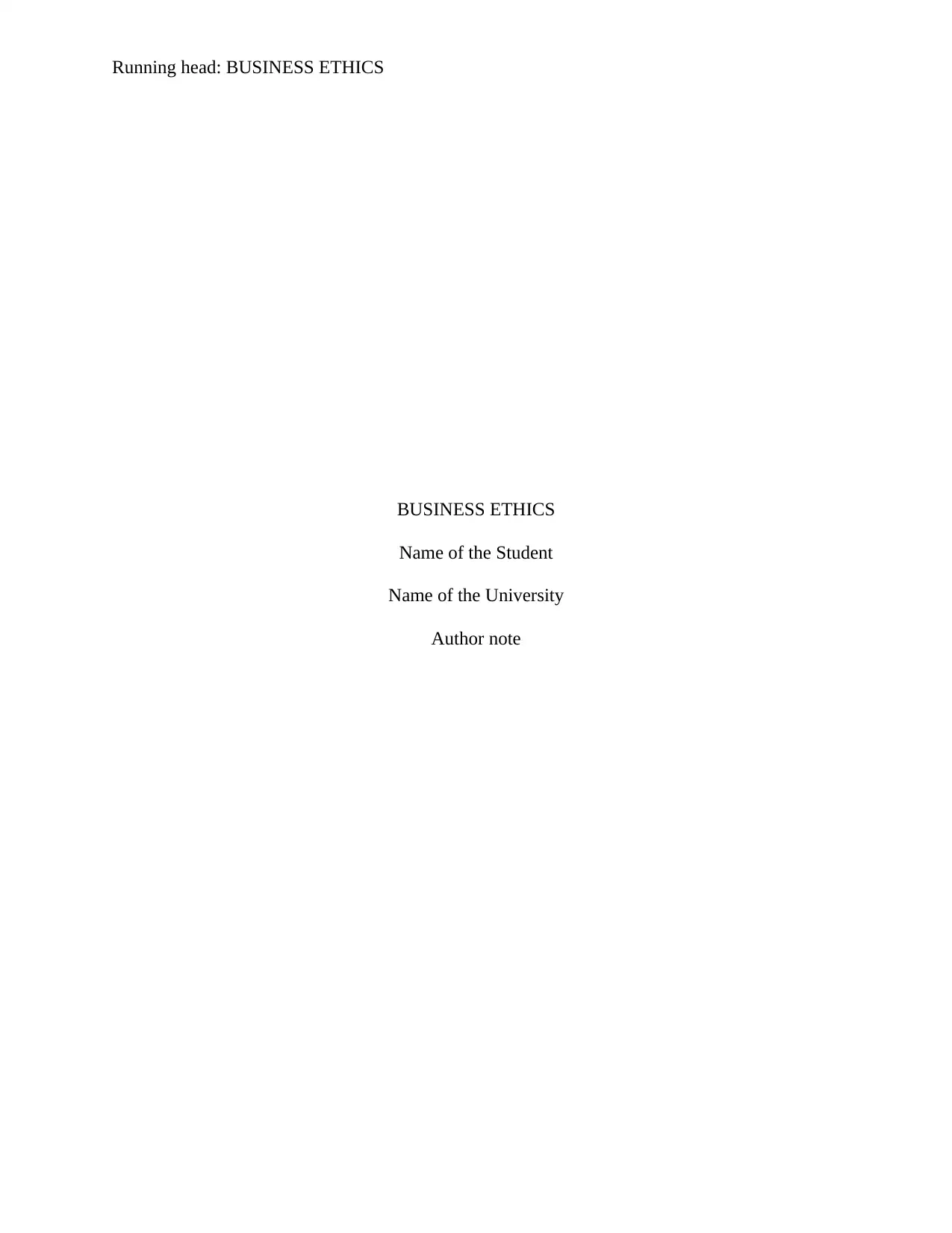
Running head: BUSINESS ETHICS
BUSINESS ETHICS
Name of the Student
Name of the University
Author note
BUSINESS ETHICS
Name of the Student
Name of the University
Author note
Paraphrase This Document
Need a fresh take? Get an instant paraphrase of this document with our AI Paraphraser
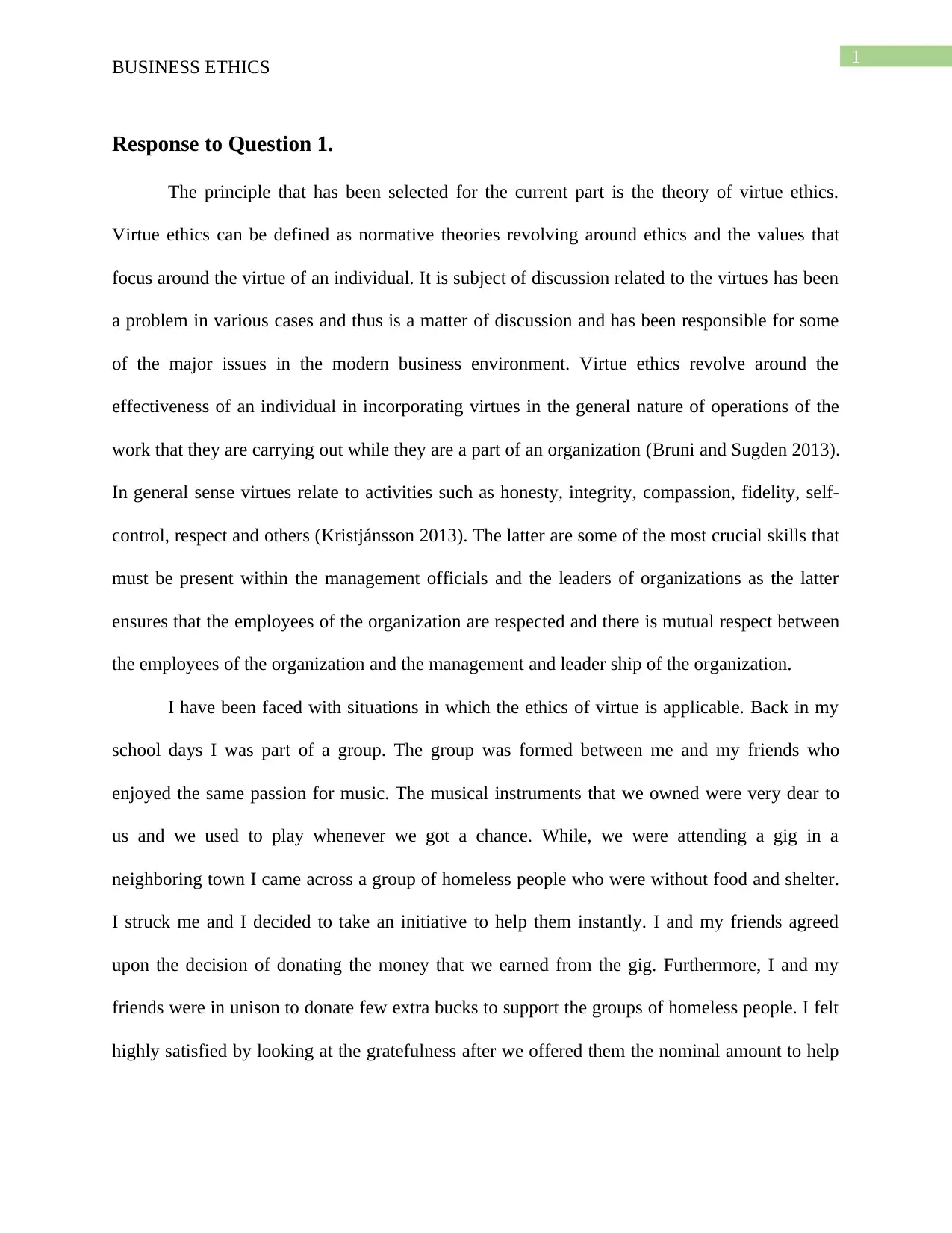
1
BUSINESS ETHICS
Response to Question 1.
The principle that has been selected for the current part is the theory of virtue ethics.
Virtue ethics can be defined as normative theories revolving around ethics and the values that
focus around the virtue of an individual. It is subject of discussion related to the virtues has been
a problem in various cases and thus is a matter of discussion and has been responsible for some
of the major issues in the modern business environment. Virtue ethics revolve around the
effectiveness of an individual in incorporating virtues in the general nature of operations of the
work that they are carrying out while they are a part of an organization (Bruni and Sugden 2013).
In general sense virtues relate to activities such as honesty, integrity, compassion, fidelity, self-
control, respect and others (Kristjánsson 2013). The latter are some of the most crucial skills that
must be present within the management officials and the leaders of organizations as the latter
ensures that the employees of the organization are respected and there is mutual respect between
the employees of the organization and the management and leader ship of the organization.
I have been faced with situations in which the ethics of virtue is applicable. Back in my
school days I was part of a group. The group was formed between me and my friends who
enjoyed the same passion for music. The musical instruments that we owned were very dear to
us and we used to play whenever we got a chance. While, we were attending a gig in a
neighboring town I came across a group of homeless people who were without food and shelter.
I struck me and I decided to take an initiative to help them instantly. I and my friends agreed
upon the decision of donating the money that we earned from the gig. Furthermore, I and my
friends were in unison to donate few extra bucks to support the groups of homeless people. I felt
highly satisfied by looking at the gratefulness after we offered them the nominal amount to help
BUSINESS ETHICS
Response to Question 1.
The principle that has been selected for the current part is the theory of virtue ethics.
Virtue ethics can be defined as normative theories revolving around ethics and the values that
focus around the virtue of an individual. It is subject of discussion related to the virtues has been
a problem in various cases and thus is a matter of discussion and has been responsible for some
of the major issues in the modern business environment. Virtue ethics revolve around the
effectiveness of an individual in incorporating virtues in the general nature of operations of the
work that they are carrying out while they are a part of an organization (Bruni and Sugden 2013).
In general sense virtues relate to activities such as honesty, integrity, compassion, fidelity, self-
control, respect and others (Kristjánsson 2013). The latter are some of the most crucial skills that
must be present within the management officials and the leaders of organizations as the latter
ensures that the employees of the organization are respected and there is mutual respect between
the employees of the organization and the management and leader ship of the organization.
I have been faced with situations in which the ethics of virtue is applicable. Back in my
school days I was part of a group. The group was formed between me and my friends who
enjoyed the same passion for music. The musical instruments that we owned were very dear to
us and we used to play whenever we got a chance. While, we were attending a gig in a
neighboring town I came across a group of homeless people who were without food and shelter.
I struck me and I decided to take an initiative to help them instantly. I and my friends agreed
upon the decision of donating the money that we earned from the gig. Furthermore, I and my
friends were in unison to donate few extra bucks to support the groups of homeless people. I felt
highly satisfied by looking at the gratefulness after we offered them the nominal amount to help
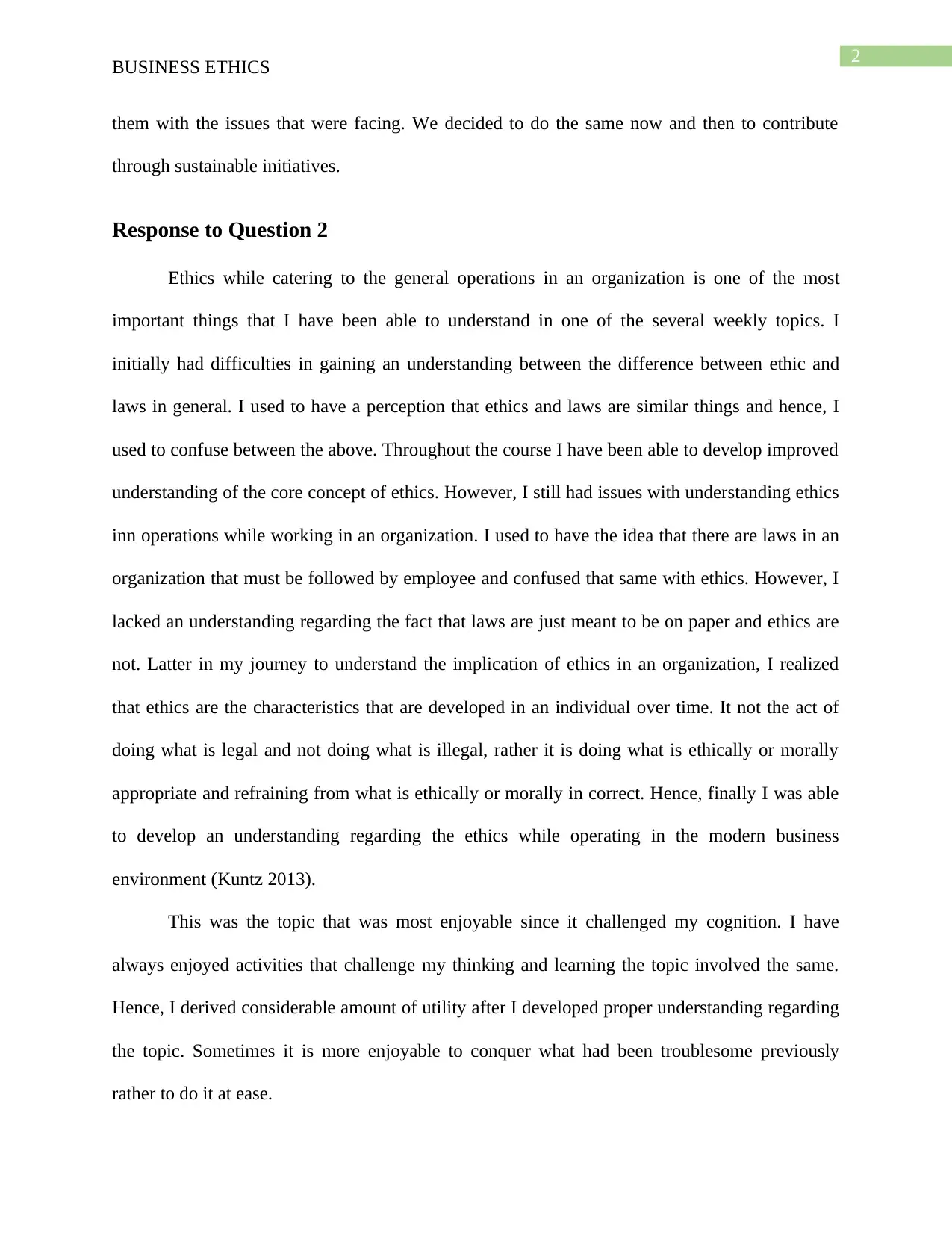
2
BUSINESS ETHICS
them with the issues that were facing. We decided to do the same now and then to contribute
through sustainable initiatives.
Response to Question 2
Ethics while catering to the general operations in an organization is one of the most
important things that I have been able to understand in one of the several weekly topics. I
initially had difficulties in gaining an understanding between the difference between ethic and
laws in general. I used to have a perception that ethics and laws are similar things and hence, I
used to confuse between the above. Throughout the course I have been able to develop improved
understanding of the core concept of ethics. However, I still had issues with understanding ethics
inn operations while working in an organization. I used to have the idea that there are laws in an
organization that must be followed by employee and confused that same with ethics. However, I
lacked an understanding regarding the fact that laws are just meant to be on paper and ethics are
not. Latter in my journey to understand the implication of ethics in an organization, I realized
that ethics are the characteristics that are developed in an individual over time. It not the act of
doing what is legal and not doing what is illegal, rather it is doing what is ethically or morally
appropriate and refraining from what is ethically or morally in correct. Hence, finally I was able
to develop an understanding regarding the ethics while operating in the modern business
environment (Kuntz 2013).
This was the topic that was most enjoyable since it challenged my cognition. I have
always enjoyed activities that challenge my thinking and learning the topic involved the same.
Hence, I derived considerable amount of utility after I developed proper understanding regarding
the topic. Sometimes it is more enjoyable to conquer what had been troublesome previously
rather to do it at ease.
BUSINESS ETHICS
them with the issues that were facing. We decided to do the same now and then to contribute
through sustainable initiatives.
Response to Question 2
Ethics while catering to the general operations in an organization is one of the most
important things that I have been able to understand in one of the several weekly topics. I
initially had difficulties in gaining an understanding between the difference between ethic and
laws in general. I used to have a perception that ethics and laws are similar things and hence, I
used to confuse between the above. Throughout the course I have been able to develop improved
understanding of the core concept of ethics. However, I still had issues with understanding ethics
inn operations while working in an organization. I used to have the idea that there are laws in an
organization that must be followed by employee and confused that same with ethics. However, I
lacked an understanding regarding the fact that laws are just meant to be on paper and ethics are
not. Latter in my journey to understand the implication of ethics in an organization, I realized
that ethics are the characteristics that are developed in an individual over time. It not the act of
doing what is legal and not doing what is illegal, rather it is doing what is ethically or morally
appropriate and refraining from what is ethically or morally in correct. Hence, finally I was able
to develop an understanding regarding the ethics while operating in the modern business
environment (Kuntz 2013).
This was the topic that was most enjoyable since it challenged my cognition. I have
always enjoyed activities that challenge my thinking and learning the topic involved the same.
Hence, I derived considerable amount of utility after I developed proper understanding regarding
the topic. Sometimes it is more enjoyable to conquer what had been troublesome previously
rather to do it at ease.
⊘ This is a preview!⊘
Do you want full access?
Subscribe today to unlock all pages.

Trusted by 1+ million students worldwide
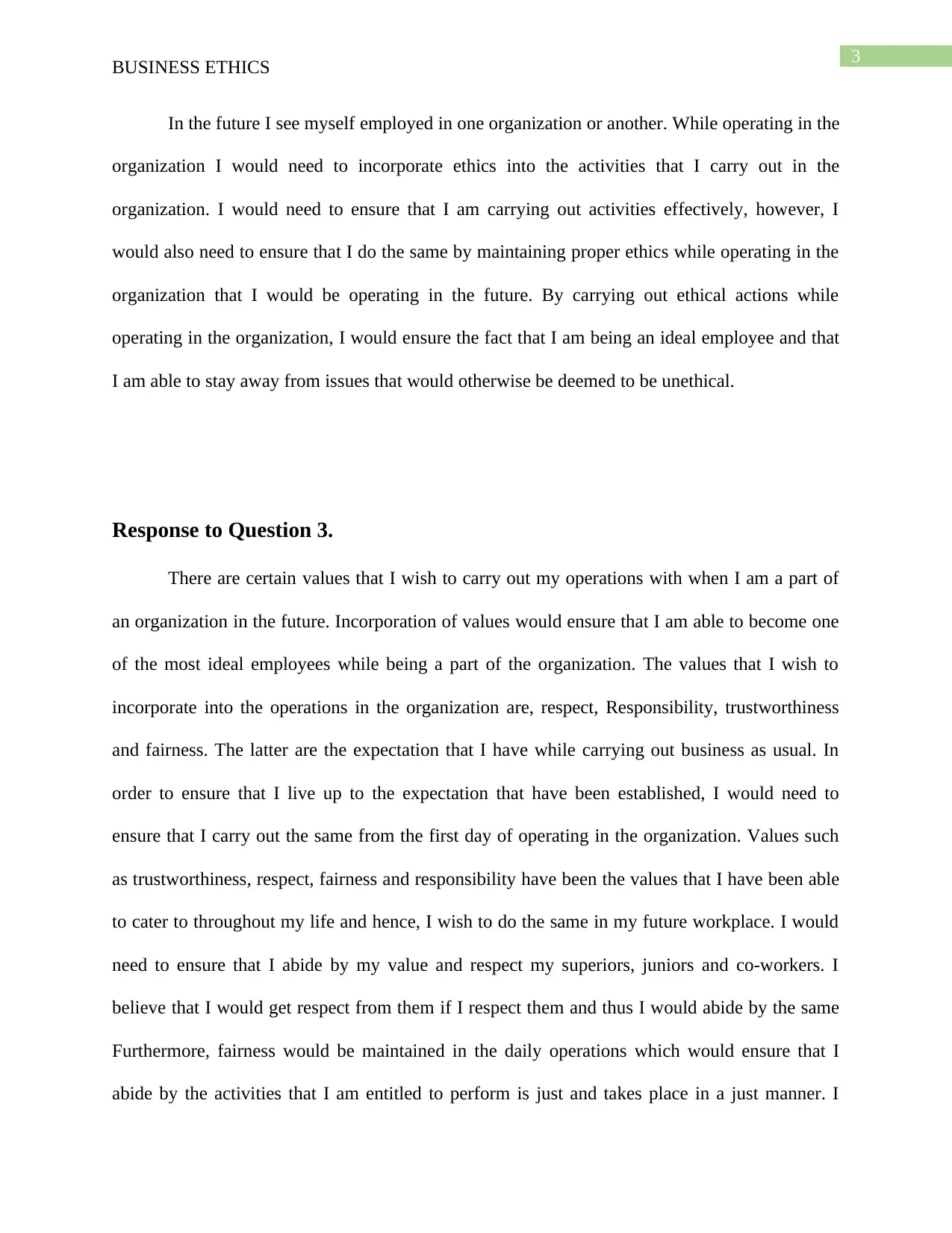
3
BUSINESS ETHICS
In the future I see myself employed in one organization or another. While operating in the
organization I would need to incorporate ethics into the activities that I carry out in the
organization. I would need to ensure that I am carrying out activities effectively, however, I
would also need to ensure that I do the same by maintaining proper ethics while operating in the
organization that I would be operating in the future. By carrying out ethical actions while
operating in the organization, I would ensure the fact that I am being an ideal employee and that
I am able to stay away from issues that would otherwise be deemed to be unethical.
Response to Question 3.
There are certain values that I wish to carry out my operations with when I am a part of
an organization in the future. Incorporation of values would ensure that I am able to become one
of the most ideal employees while being a part of the organization. The values that I wish to
incorporate into the operations in the organization are, respect, Responsibility, trustworthiness
and fairness. The latter are the expectation that I have while carrying out business as usual. In
order to ensure that I live up to the expectation that have been established, I would need to
ensure that I carry out the same from the first day of operating in the organization. Values such
as trustworthiness, respect, fairness and responsibility have been the values that I have been able
to cater to throughout my life and hence, I wish to do the same in my future workplace. I would
need to ensure that I abide by my value and respect my superiors, juniors and co-workers. I
believe that I would get respect from them if I respect them and thus I would abide by the same
Furthermore, fairness would be maintained in the daily operations which would ensure that I
abide by the activities that I am entitled to perform is just and takes place in a just manner. I
BUSINESS ETHICS
In the future I see myself employed in one organization or another. While operating in the
organization I would need to incorporate ethics into the activities that I carry out in the
organization. I would need to ensure that I am carrying out activities effectively, however, I
would also need to ensure that I do the same by maintaining proper ethics while operating in the
organization that I would be operating in the future. By carrying out ethical actions while
operating in the organization, I would ensure the fact that I am being an ideal employee and that
I am able to stay away from issues that would otherwise be deemed to be unethical.
Response to Question 3.
There are certain values that I wish to carry out my operations with when I am a part of
an organization in the future. Incorporation of values would ensure that I am able to become one
of the most ideal employees while being a part of the organization. The values that I wish to
incorporate into the operations in the organization are, respect, Responsibility, trustworthiness
and fairness. The latter are the expectation that I have while carrying out business as usual. In
order to ensure that I live up to the expectation that have been established, I would need to
ensure that I carry out the same from the first day of operating in the organization. Values such
as trustworthiness, respect, fairness and responsibility have been the values that I have been able
to cater to throughout my life and hence, I wish to do the same in my future workplace. I would
need to ensure that I abide by my value and respect my superiors, juniors and co-workers. I
believe that I would get respect from them if I respect them and thus I would abide by the same
Furthermore, fairness would be maintained in the daily operations which would ensure that I
abide by the activities that I am entitled to perform is just and takes place in a just manner. I
Paraphrase This Document
Need a fresh take? Get an instant paraphrase of this document with our AI Paraphraser
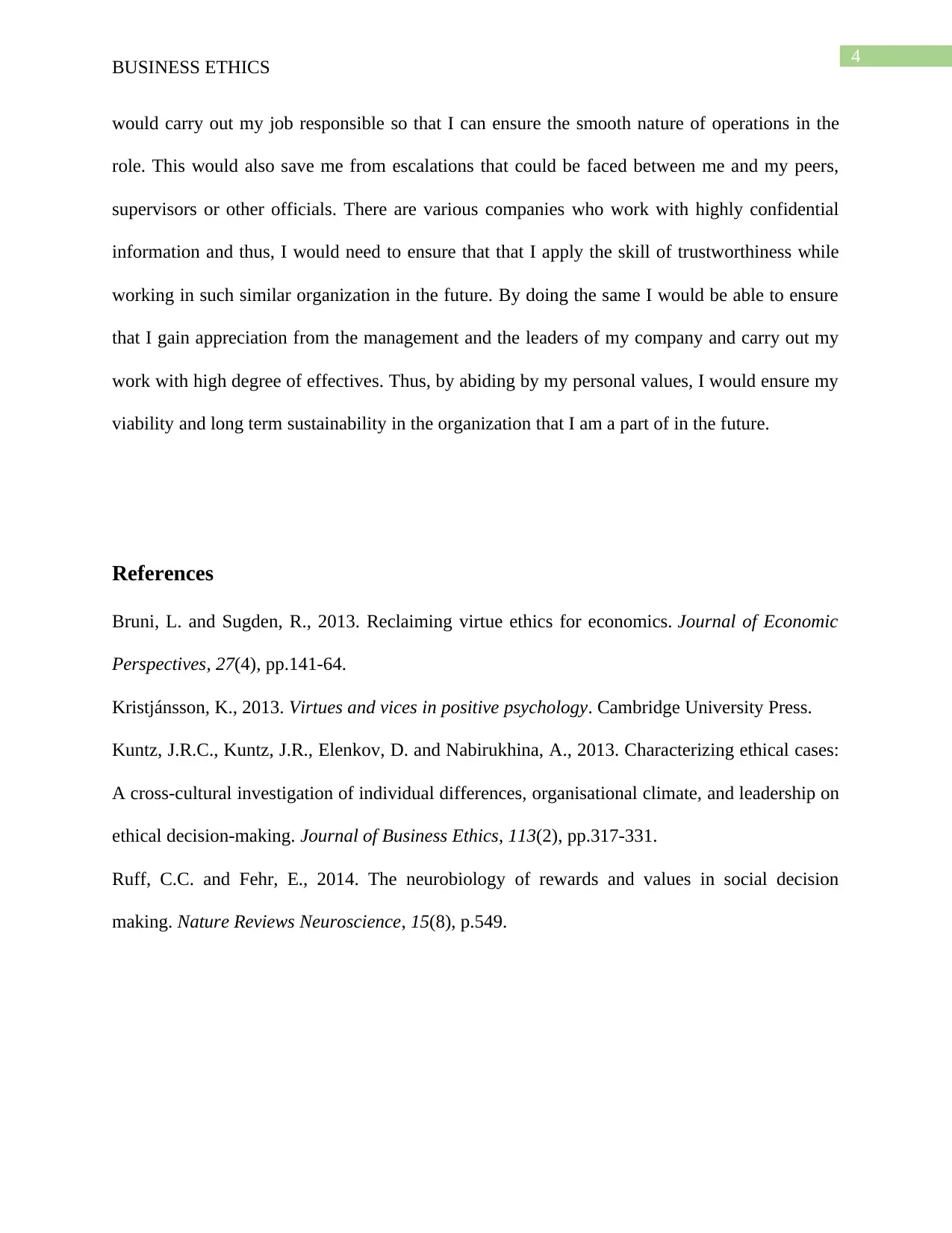
4
BUSINESS ETHICS
would carry out my job responsible so that I can ensure the smooth nature of operations in the
role. This would also save me from escalations that could be faced between me and my peers,
supervisors or other officials. There are various companies who work with highly confidential
information and thus, I would need to ensure that that I apply the skill of trustworthiness while
working in such similar organization in the future. By doing the same I would be able to ensure
that I gain appreciation from the management and the leaders of my company and carry out my
work with high degree of effectives. Thus, by abiding by my personal values, I would ensure my
viability and long term sustainability in the organization that I am a part of in the future.
References
Bruni, L. and Sugden, R., 2013. Reclaiming virtue ethics for economics. Journal of Economic
Perspectives, 27(4), pp.141-64.
Kristjánsson, K., 2013. Virtues and vices in positive psychology. Cambridge University Press.
Kuntz, J.R.C., Kuntz, J.R., Elenkov, D. and Nabirukhina, A., 2013. Characterizing ethical cases:
A cross-cultural investigation of individual differences, organisational climate, and leadership on
ethical decision-making. Journal of Business Ethics, 113(2), pp.317-331.
Ruff, C.C. and Fehr, E., 2014. The neurobiology of rewards and values in social decision
making. Nature Reviews Neuroscience, 15(8), p.549.
BUSINESS ETHICS
would carry out my job responsible so that I can ensure the smooth nature of operations in the
role. This would also save me from escalations that could be faced between me and my peers,
supervisors or other officials. There are various companies who work with highly confidential
information and thus, I would need to ensure that that I apply the skill of trustworthiness while
working in such similar organization in the future. By doing the same I would be able to ensure
that I gain appreciation from the management and the leaders of my company and carry out my
work with high degree of effectives. Thus, by abiding by my personal values, I would ensure my
viability and long term sustainability in the organization that I am a part of in the future.
References
Bruni, L. and Sugden, R., 2013. Reclaiming virtue ethics for economics. Journal of Economic
Perspectives, 27(4), pp.141-64.
Kristjánsson, K., 2013. Virtues and vices in positive psychology. Cambridge University Press.
Kuntz, J.R.C., Kuntz, J.R., Elenkov, D. and Nabirukhina, A., 2013. Characterizing ethical cases:
A cross-cultural investigation of individual differences, organisational climate, and leadership on
ethical decision-making. Journal of Business Ethics, 113(2), pp.317-331.
Ruff, C.C. and Fehr, E., 2014. The neurobiology of rewards and values in social decision
making. Nature Reviews Neuroscience, 15(8), p.549.
1 out of 5
Related Documents
Your All-in-One AI-Powered Toolkit for Academic Success.
+13062052269
info@desklib.com
Available 24*7 on WhatsApp / Email
![[object Object]](/_next/static/media/star-bottom.7253800d.svg)
Unlock your academic potential
Copyright © 2020–2026 A2Z Services. All Rights Reserved. Developed and managed by ZUCOL.





